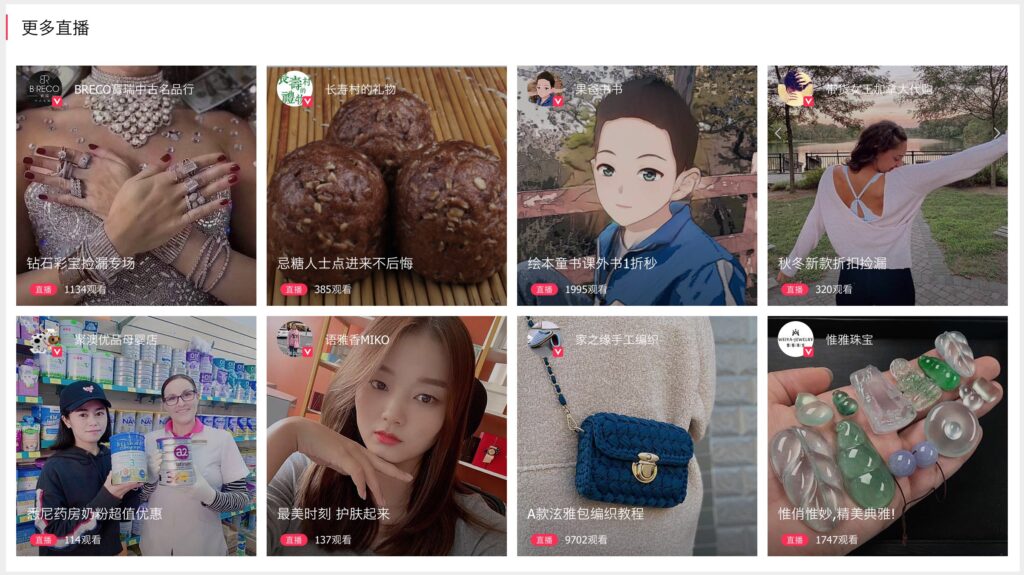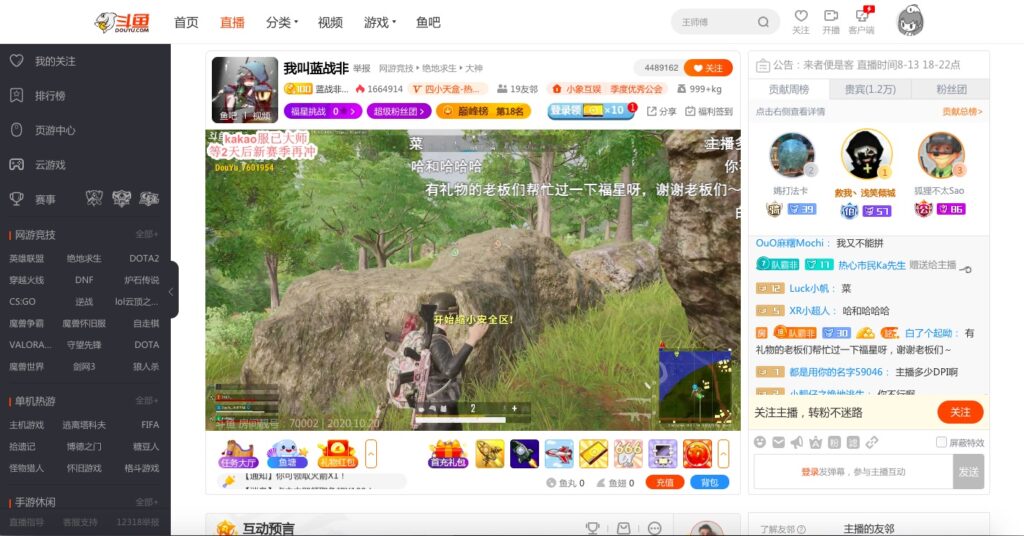eCommerce live-streaming is an increasingly exciting sales channel. We touched on that topic in our recent blog about How China's Cosmetics Live-Streaming Flourished in 2020Live-streaming is not just the future of cosmetics eCommerce - in China, it's the present! Learn more about this exciting industry here.cosmetics live-streaming. But this channel is becoming important to more than just the cosmetics market. Other product categories like fashion and health supplements are finding success with live-streaming also.
But not all platforms are made equal, and some platforms are better suited to eCommerce than others. As with many online innovations, China finds itself at the forefront of the development of eCommerce live-streaming. That means that Chinese eCommerce live-streaming platforms can be useful examples to explore when looking at the characteristics to look for when trying to find a good fit for your brand.
In this article we run through the top platform options in China, and see why they are or aren't a good fit for eCommerce. If you're looking to use this exciting new sales channel in another country, you can take these reasons and see which platforms in your intended market might have the same qualities.
Taobao Live

Taobao and Alibaba's family of eCommerce platforms are giants of the Chinese Internet. As such, it should come as no surprise that they were quick to dive in headfirst when eCommerce live-streaming began to emerge. Taobao Live's main advantage is its huge user-base, which it owes to its attachment to the eCommerce behemoth. The platform also claims to have high user stickiness on top of this. Another key advantage is the natural integration of all its eCommerce functionality, tying directly into the standard Taobao eCommerce platform. This also means that consumers are not just familiar with but also happy to put their trust in the platform and its eCommerce live-streams. Taobao itself supports the growth of its eCommerce live-streaming through offering training and incentive mechanisms for streamers.
By the end of last year the platform was said to host 350,000 hours of live-streaming content every single day. Grassroots merchants, emerging KOLs, and full-blown celebrities can all be found on the platform's eCommerce live-streams. As a result, live-streaming channels receive 700 million engagements each month from consumers on Taobao Live. Conversion rates are also high, with the latest figure being pegged at more than 65%, while growth rates have been upwards of 150% for three years in a row. In 2019, the turnover was more than 250 billion RMB.
All of this paints a picture of a mature and successful platform for eCommerce live-streaming. But there are downsides to platforms like this too. Because there are already so many established merchants on the platform, standing out from the crowd can be a challenge. Building up a loyal user-base often means keeping streams going for as many as eight hours each day, which is a big ask for brands that are still new to the idea. Additionally, Taobao curates applicants to become streamers. Therefore brands may not find this path to be possible in some cases (though the platform has held "Zero Threshold" entry schemes to ease this process).
The top product categories on Taobao Live are cosmetics and fashion, with mother & baby products, gourmet food, and jewelry following behind. These represent a fairly typical spread of the categories where eCommerce live-streaming has thrived across most platforms, as you might expect from such a large and popular platform.
Douyin (TikTok)

Douyin, known outside of China as TikTok, is an online video platform with global recognition. Its massive success across numerous markets worldwide has made it a household name and a platform that industry experts keep a close eye on. In China, this success has translated to considerable success in the sphere of eCommerce live-streaming.
Boasting more than 470 monthly engagements in China alone, Douyin's KOL- and online celebrity-focused eCommerce live-streaming offerings have proven a resounding success. It was apparently only a small jump from short video content to live-streamed video content for the platform's fans.
As with Taobao Live, the advantage here is traffic volume. Unlike Taobao, data suggests that building up a user-base can be fairly quick, so long as your channel is able to grab attention from the start. Well-made content in particular has proven able to build a strong following in a much shorter time than on Taobao Live.
The disadvantage of Douyin as an eCommerce live-streaming platform is that its eCommerce functionality is less seamlessly integrated than Taobao Live, and it has yet to develop a completely closed-loop buying process (though the platform aims to correct this through developing its recently launched 'Luban eCommerce' program). Because most of the traffic on the platform is still there to be entertained rather than to shop, unlike Taobao, conversion rates are also lower. On top of that, there isn't much WeChat integration. No direct sharing to WeChat is supported, and there is only limited support for sharing to WeChat via QR codes. Instead, would-be buyers are redirected outside the platform and onto third-party stores such as Taobao or Jingdong.
eCommerce on Douyin mostly comprises the beauty and fashion product categories, as with Taobao, while its demographics tend to be middle-class and urban young women in first- and second-tier cities.
Kuaishou

Kuaishou is a short video platform like Douyin/TikTok. While not as internationally popular as its rival, it has a strong user-base in mainland China. The platform has also become another important battleground for eCommerce live-streaming in the country. Kuaishou uses two mechanisms to facilitate eCommerce. Firstly, it is conveniently compatible with sharing to WeChat and Weibo, and linking to third-party eCommerce platforms like Taobao. Secondly, it has its own built-in eCommerce infrastructure under the Kuaishou Store label. Using these two mechanisms, eCommerce transactions are able to offer consumers a full range of convenient options.
Perhaps as a result, Kuaishou boasts strong conversion rates and consumer loyalty. Brands can enjoy the benefits of a content pushing mechanism, especially those just starting out on the platform.
A drawback to Kuaishou is that for the most part it is low-cost and budget brands that appear to thrive on the platform. Perhaps due to Kuaishou's greater audience share in lower-tier cities and towns, consumers on the platform prefer to buy cheap or look for deals. Most sales are for goods around or below 100 RMB. For some brands, Kuaishou may not fit well into their strategy and pricing.
WeChat - Tencent Kandian Live and Mini-Program Live-Streaming

Social media giant WeChat, the uncontested king of apps in China, also supports eCommerce live-streaming. In fact, it does so in two distinct ways. Tencent's own Kandian Live platform is a mature and convenient platform for live-streaming. It features seamlessly integrated into WeChat's existing ecology. But WeChat's 'applet' Mini-Programs feature also supports both live-streaming and eCommerce (and the mix of the two). They also give brands more control over the nature and presentation of their streaming and eCommerce options.
Both these options are user-friendly and primed to take advantage of WeChat's user-base. That's nothing to sniff at when that user-base is in excess of 1 billion accounts. Consumers already use WeChat for everything from day-to-day chatting with friends to ordering groceries. That means it's an easy transition to jump to making purchases on streamed videos within the app. The app's social tools also make it easy for streams to gain word-of-mouth traction and so expand their outreach.
You do need to first apply to set up a Kandian Live account. However, WeChat Mini-Programs are much easier to set up.
Other Large Streaming Platforms

There are multiple large streaming platforms in China. Not all of them make for a good fit for eCommerce live-streaming, however. Even those that do offer some level of support for such. Gaming-oriented streaming platforms like Huya Live and Douyu Live are similar to popular Western platform Twitch. They do have some level of support for payments in their system. But overall they are not big movers in the eCommerce live-streaming space. Their users visit the platforms purely for entertainment, and engage with gaming-related streaming content. As such, they often respond negatively to advertisements or product placements. Additionally, they can be less happy to jump to making purchases mid-stream.
It's important to keep an eye out on more than just the size or popularity of a streaming platform. Its suitability to eCommerce, and motivations of its users can be more important factors.








